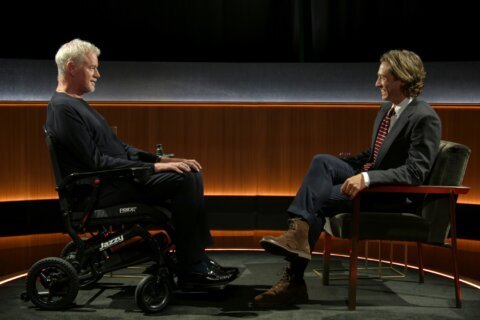WASHINGTON — The same gum that sticks to the bottom of detectives’ shoes clings to the feet of investigative journalists and filmmakers who pound the pavement with equal ferocity.
That truth-seeking spirit is alive and well thanks to the first-ever Investigative Film Festival, which kicked off Wednesday night at the National Portrait Gallery with a packed screening of the journalism thriller “Spotlight” and a Q&A moderated by David Simon, creator of TV’s “The Wire.”
The film stars Michael Keaton, Rachel McAdams, Mark Ruffalo, Liev Schreiber and John Slattery in the true story of Boston Globe journalists who won a Pulitzer Prize by uncovering a child sex abuse scandal by the Catholic Church. The revelations stretched from Boston to around the world.
“This movie is in the long, beautiful tradition of journalism … and the role of the journalist being to comfort the afflicted and to afflict the comfortable. This is a movie that is really about how a news organization can take on entrenched institutions to right wrongs,” Festival Founding Director Diana Schemo tells WTOP. “It’s essentially like an ‘All the President’s Men’ for our times.”
That’s an apt analogy, as Ben Bradlee Jr. (Slattery) was among the Globe journalists at Wednesday’s Q&A, including Spotlight team editor Walter Robinson (Keaton) and reporters Sacha Pfeiffer (McAdams) and Michael Rezendes (Ruffalo). In a brilliant stroke of fate, the Q&A saw Bradlee Jr. sitting next to former Globe editor Marty Baron (Schreiber), who recently became editor of The Washington Post, a position made so famous by Bradlee Sr. that it won Jason Robards an Oscar.
“I think he’s done great work for The Post, so I hope everyone will appreciate what we’ve done with his character,” screenwriter Josh Singer tells WTOP.
As if the Baron-Bradlee connection weren’t enough to suggest “Spotlight” is guided by fate, this D.C. premiere of a Church cover-up film comes exactly a week after Pope Francis’ historic visit to the White House and just days after the pontiff met with sex abuse victims in Philadelphia.
“There’s an interesting synergy to that,” director Tom McCarthy tells WTOP. “We’re excited about it and feel like maybe this film on some level, outside of being a good story, will forward the dialogue that needs to happen on that particular subject matter.”
During the Q&A, McCarthy told the crowd that he was inspired to make a journalism film after being cast by Simon as a Baltimore Sun reporter in Season 5 of “The Wire.” Simon himself worked for The Sun from 1982-1995, making “Spotlight” all the more personal to watch.
“Reporting to me was as (H.L.) Mencken said, it was the life of kings when it was done well,” Simon tells WTOP. “Watching it, it was kind of like porn for me. It was nostalgic porn.”
Ironically, it’s the lack of graphic nature that Simon says makes a project like “Spotlight” hard to convince studio executives to greenlight.
“It’s the kind of film that doesn’t get told enough because it lacks all the things that the entertainment industry thinks is currency. There’s not a lot of sex in it, not a lot of violence, but there’s a lot of paper and there’s a lot of ideas and a lot of humanity,” Simon says. “The actual stakes of something that we all should be vested in as a society is laid bare. Films don’t get made because they have this currency and not the other crap. So to see it executed as well as it was and to be up there with the filmmakers and the subjects of the film, I’m delighted it got made and was happy to be able to exhibit it tonight.”
“Spotlight” is just one of the many urgent flicks playing at the Investigative Film Fest through Oct. 2. Schemo and Associate Director Sky Sitney began planning the festival a year and a half ago with both documentaries and narrative films, differentiating it from Sitney’s former home at AFI Docs.
On the documentary side, be sure to check out “Drone,” about CIA use of military drone strikes.
“It’s really looking at the rise of warfare by joystick,” Schemo says. “How the Air Force recruits young men and women and goes to gaming conventions and how the process of waging in this age is so counter to what we’ve always known. It kind of looks at the psychological difficulties of that and consequences of it. … It’s a very intimate portrait of something that is, by definition, remote.”
Drone warfare isn’t the only timely topic explored by the festival. The immigration debate is explored in riveting fashion in “Cartel Land.” Executive produced by the incomparable Kathryn Bigelow (“The Hurt Locker”), the film won Sundance’s documentary prizes for Best Director (Matthew Heineman) and Best Cinematography (Heineman and Matt Porwoll) for its gritty, fearless footage.
The film tracks vigilantes who battle drug cartels on both sides of the U.S.-Mexico border. On the American side is Tim “Nailer” Foley, leader of the Arizona Border Recon. On the Mexican side is Dr. Jose Manuel Mireles, leader of the Michoacán-based Autodefensas.
A different sort of drug trafficking is explored in the documentary “Deep Web,” named after the encrypted Internet you don’t see beneath the surface. It follows a 30-year-old entrepreneur who’s arrested on accusations that he’s a notorious figure known as “Dread Pirate Roberts,” who created and operated the online black market known as Silk Road.
“This is about the government’s effort to control commerce and specifically drug trafficking,” Schemo says. “They target this fellow who they believe is the architect of this Silk Road operation, but you come to think in the film that this figure is actually an identity assumed by many people, and he is one of many, so that he may have had some part in it, but it seems unlikely that he would be the only one, or the one that’s responsible for the part that the government is upset about.”
The festival closes with the premiere of the controversial flick “(T)error,” which follows Saeed “Shariff” Torres, who became a confidential FBI informant as a way to avoid jail time after being busted for being part of the Black Panthers in the early 1970s.
“He was fine with it for many years, but then after 9/11 his job changed,” Schemo says. “Suddenly, he’s responsible for infiltrating mosques and essentially mounting sting operations against Americans or anybody in the mosque who the FBI might be a risk for committing a terrorist act. So there’s a lot of discussion whether this is entrapment or whether the person would actually have done it. What’s interesting is that Torres himself is very conflicted about what he’s doing.”
That’s just a taste of some of the many investigative films screening now through Oct. 2. Most of the screenings will be held at the National Portrait Gallery with a few other events at both the Newseum and Woolly Mammoth Theatre. Click here for the full schedule of screenings.
Tickets are $15 per screening or $50 for a full pass to all of the screenings. You can also pay $225 for access to all of the films, symposium events and happy hours. Military, senior, student and other discounts apply, including a special treat where teachers can bring their entire classes for free.
“With a really well-done film, you can reach people who would never think to pick up a newspaper,” Schemo says. “We felt that (investigative reporting) was beleaguered in the sense that most people didn’t understand what investigative reporters did. The more we started looking into films and investigative reporting and the nexus between the two, we realized we were stumbling into something really timely because there’s been a real explosion of creativity at the crossroads.”
Listen below for the full interview with Diana Schemo, founder of the Investigative Film Festival.








